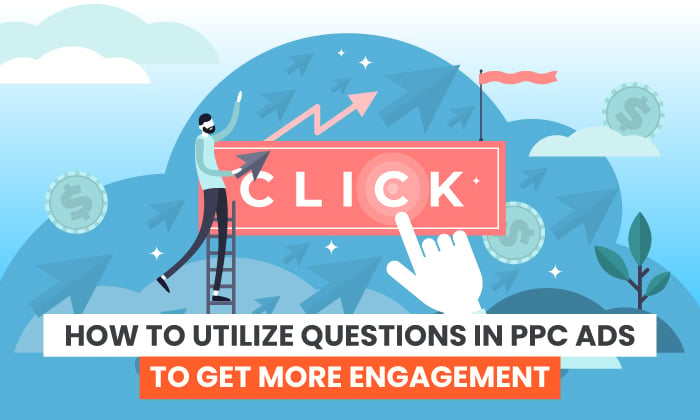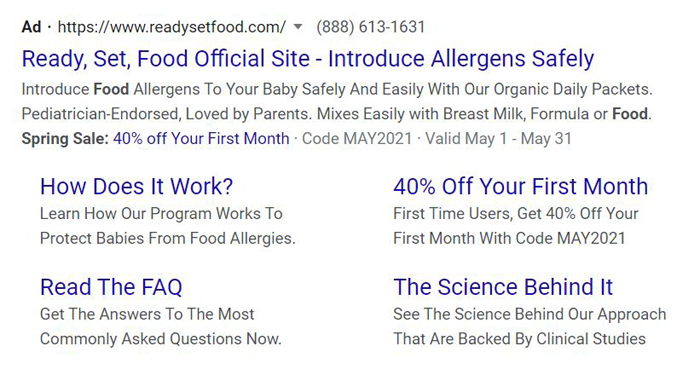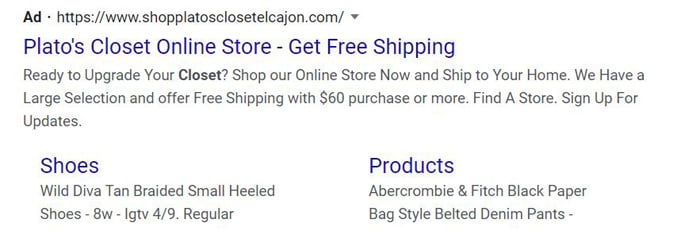
How often do you see ads asking a question?
Whether you notice or not, plenty of PPC ads utilize questions to get more engagement. The questions can be literal or rhetorical, but either way, they’re trying to get you to click so you can learn the answer.
Does this method work for PPC campaigns?
In this article, we’ll discuss why you should consider asking questions in your PPC ads and provide tips about best practices in doing so.
Why Should You Use Questions in Your PPC Ads?
Questions are how people show interest in each other’s lives, and they’re a regular part of our everyday lives to boot. When ads use questions effectively, potential customers may feel like the brand cares about them and isn’t simply trying to sell them something.
That said, marketers can’t measure how customers feel. But, you can measure data to see if your questions in PPC ads are driving people to your page. Here are some reasons marketers have discovered questions in PPC ads work:
1. Get People’s Attention
A question can easily pique people’s interest, especially if it’s about a relatable struggle.
Let’s say you’re a marketing agency.
Try starting your PPC ads with statements like, “Do you want to increase your conversion rate?” or “Do you want to boost marketing results?”
The answers to these questions may seem like no-brainers. Yet, they can easily attract the attention of business owners who are desperately looking for ways to improve their sales results, as they want you to answer these questions for them without having to dig further.
2. Questions Can Boost Engagement
Engaging your audience is essential. If they feel like you’re talking at them, not with them, they have no reason to click, like, share, or comment.
So, if you ask a question they want an answer to or want to answer, you’re inviting them into the conversation, not giving them the hard sell.
Your ultimate goal is to convert people into paying customers, but engaging with them via questions could get them to want to purchase from you instead of the person who simply said: “buy our product.”
3. More Clicks on PPC Ads with Questions
Not only can questions pique interest, but they can tap into a feeling of social obligation. When you ask someone a question in “real life,” they often feel obligated to answer. While your PPC ad isn’t staring at a user anticipating an answer, the reader could feel like they need to respond.
Or, they could have that question themselves—maybe they even typed in that exact question, and that’s why they see your ad. It could feel like they asked you the question and are now the ones waiting for your answer!
Asking a question you want them to answer, like “Are you ready to take the leap?” or a question they may have asked, like “Why should I travel to Iceland?” could make them click.
Note: Be sure your PPC ad’s link actually answers the question, provides relevant information before they provide contact information, or is directly related to the query in another way. Don’t just send them to your homepage unless the answer is there.
4. Showcase Brand Personality
The questions you ask will give customers an idea about your brand identity or personality.
Let’s take a look at the difference between these two questions:
“What’s your next six-figure move?”
“If you could travel anywhere for free, where would it be?”
The first question will likely give the impression that a business-savvy financial advisor or entrepreneur wrote the ad. It may even attract like-minded individuals who want to learn about generating passive income or building their own business.
The second question could let viewers see you as a company with a genuine interest in their dreams and futures. The “if you could” portion may also trigger viewers to share the dream destinations they’ve been saving up for, which could increase visibility if your PPC ad is on social media and not a search engine.
You only have one chance to make a good first impression, so be sure your question does that for you.
5 Times You Should Use Questions in PPC Ads
How can you utilize questions when making your PPC ads? Here are five ways you can use them to yield the results you want.
1. Use Questions to Make a Tough Sell
There are brand messages which are easy to communicate, like “Buy now to get 70 percent off your first order,” or “Sign up to get free access to our course.” These statements answer a question that didn’t even need to be asked: “Do you want something for cheap or free?” So, questions aren’t needed.
However, when you’re making a tough sell, peppering your ad with a few questions can help readers ease into the idea of consuming your content or opting into your business.
Let’s say you’re a blogger in the finance industry who wants to talk about the perks of investing. Money can be a touchy subject—even an intimidating one—for many. Using questions focusing on the perks of investing or reflecting things readers may already be wondering could draw them in.
You could write something like, “Do you want to abandon the 9-to-5 grind and be your own boss?” or “Do you want to retire in your 50s?”
These inquiries can get people to notice your ads because they’re exciting and relatable.
2. Use Questions as Conversation Starters
Think about the last time you approached a stranger in a social situation.
To avoid being awkward, you probably introduced yourself with your name and a brief statement, then asked a question like, “How do you know [insert mutual friend’s name]?”
It’s the same way for PPC ads.
Questions are a good starting point to introducing your business and the services you offer without putting on too much pressure.
For example, Ready Set Food’s PPC ads introduce the company by name and give some basic information. First-time parents who are concerned about their baby’s diets may already be interested in the topic, but the CTA “How Does It Work?” truly gets the conversation started.

3. Use Questions to Encourage Readers to Click the CTA
Asking a question reflecting the reader’s thoughts or addressing a pain point could lead them to click the call-to-action (CTA). The CTA could be the question itself, or the question could lead to the CTA.
A question that could be the CTA is reflected in the Ready, Set, Food ad above: How does it work?
Regent Atlantic’s PPC ad uses a question to lead readers to the CTA by asking, “Do you have a financial plan that works for you?” They then encourage people to click their ad to get the financial help they need.

4. Use Questions to Introduce Your Business
Including a question related to your businesses’ niche is a good starting point to establishing a relationship with your customers.
SEO agency Pushfire starts with the question, “Tired of SEO services that take shortcuts or attempt to game the latest algorithm?” Since SEO is a broad and complicated topic, the loaded question helps give a brief introduction of what their agency offers and how hard they’re willing to work for you.

5. Use a Question to Introduce a Solution
PPC ads can have questions that introduce problems the audience may already have.
Your products or services should provide the solution, immediately answering the question in a way that lets the audience know this. People are looking for solutions, not problems.
For example, Bookakery Boxes’ PPC ad starts with, “Looking for a gift that will last beyond Christmas?” Their answer is their subscription box program, which lets people give books to their loved ones throughout the year.

6 Tips for Using PPC Ad Questions Successfully
It’s not just what you say; it’s how you say it. When it comes to questions in PPC ads, you need to know not just when to ask them but how and why you’re doing so.
1. Understand Your Message
What does your company stand for, and what does it offer? You need to answer these questions for yourself before you ask your audience anything.
The questions you ask readers should help them relate to your message.
For instance, if you run a travel agency focusing on affordability, you could ask, “Are you dreaming of a vacation but worried about the cost?”
Or, if you run a clothing store that donates a portion of all proceeds, you could ask, “Do you want to look great while helping others?”
In both of these, the audience knows what your company is all about from one simple question.
2. Keep Them to a Minimum
Chances are, we’ve all met someone who just constantly asks question after question, and eventually, they become background noise at best.
Questions are more effective when they are utilized infrequently.
Plus, asking too many questions could make your copy seem deceitful and spammy, like you’re trying to get answers out of them, not help them solve a problem. Not surprisingly, no one wants to see too many questions because we prefer to get answers or solutions.
Just include one question to maximize the impact of your ads.
3. Make the Questions Seem Natural
Questions are natural parts of human conversation, and copy should reflect that—and no more than that.
These days, it’s not uncommon for keywords to be questions. Historically, it was best to have your long-tail keywords be verbatim in your copy; now, search engines are smart enough to understand context. Don’t wedge those questions in, especially repeatedly, just to fit your keywords.
There’s nothing wrong with adding questions every now and then. You want to make your PPC ad copy seem like you’re encouraging a friend to make it more engaging and enticing. Just don’t overdo it.
4. Understand Your Audience
Picking the right question involves understanding your audience.
What are the most common dilemmas of your target audience? Why would they need your products or services? Formulating questions along these lines will help you create copy that resonates with your intended viewers.
5. Keep Questions Positive
Your questions should make people excited, not scared or unhappy. A question that only has a negative response could lead to a negative perception of your brand.
For example, the question “Do you want a house infested with rats?” could make readers uncomfortable and respond strongly with “no,” or even, “how dare you assume I would?” After all, it conjures an image of a house with a rat infestation and implies someone, somewhere, may say, “why yes, yes I do!”
In contrast, the question “Do you have rats and want them gone?” makes your intended message more concise and clear. Readers know you’re offering products and services designed to take care of a rat infestation without assuming they do have a house full of rats.
Plus, people want solutions to their problems, and positively phrased questions and responses offer those.
6. Only Ask When You Know What the Answer Will Be
When you ask someone to become engaged to be married, you’re likely already pretty sure they’ll say “yes.” The same goes when asking a reader to engage with your content—you need to be pretty sure the answer will be “yes.”
In other words, the “yes” should be so expected that the question is rhetorical.
For example, Plato’s Closet has a PPC ad with the words, “Ready to upgrade your closet?”

In this situation, people who read the copy are more likely to stop and stare because of the free shipping option. The question just drove the message home.
Getting readers to respond “yes” to this early on, to the point where they click on the CTA, may make them more likely to answer “yes” once they’ve reached your product page. They’re already pretty excited about the questions they’ve already responded affirmatively to.
Conclusion
Questions in PPC ads could help you engage with your readers in various ways.
They can introduce your business, engage your audience at a human level, or make them excited to learn more. It can also be used to bring up a solution to a problem, which may encourage your audience to respond to your CTA.
Ask questions aligned with your main message. Make sure they seem natural and show you understand your target audience.
As long as you keep these tips in mind, you could create PPC ads that produce excellent results.
How will you use questions to get more engagement with your PPC ads?
About us and this blog
We are a digital marketing company with a focus on helping our customers achieve great results across several key areas.
Request a free quote
We offer professional SEO services that help websites increase their organic search score drastically in order to compete for the highest rankings even when it comes to highly competitive keywords.
Subscribe to our newsletter!
More from our blog
See all postsRecent Posts
- Web Hosting September 26, 2023
- Affiliate Management September 26, 2023
- Online Presence Analysis September 26, 2023

